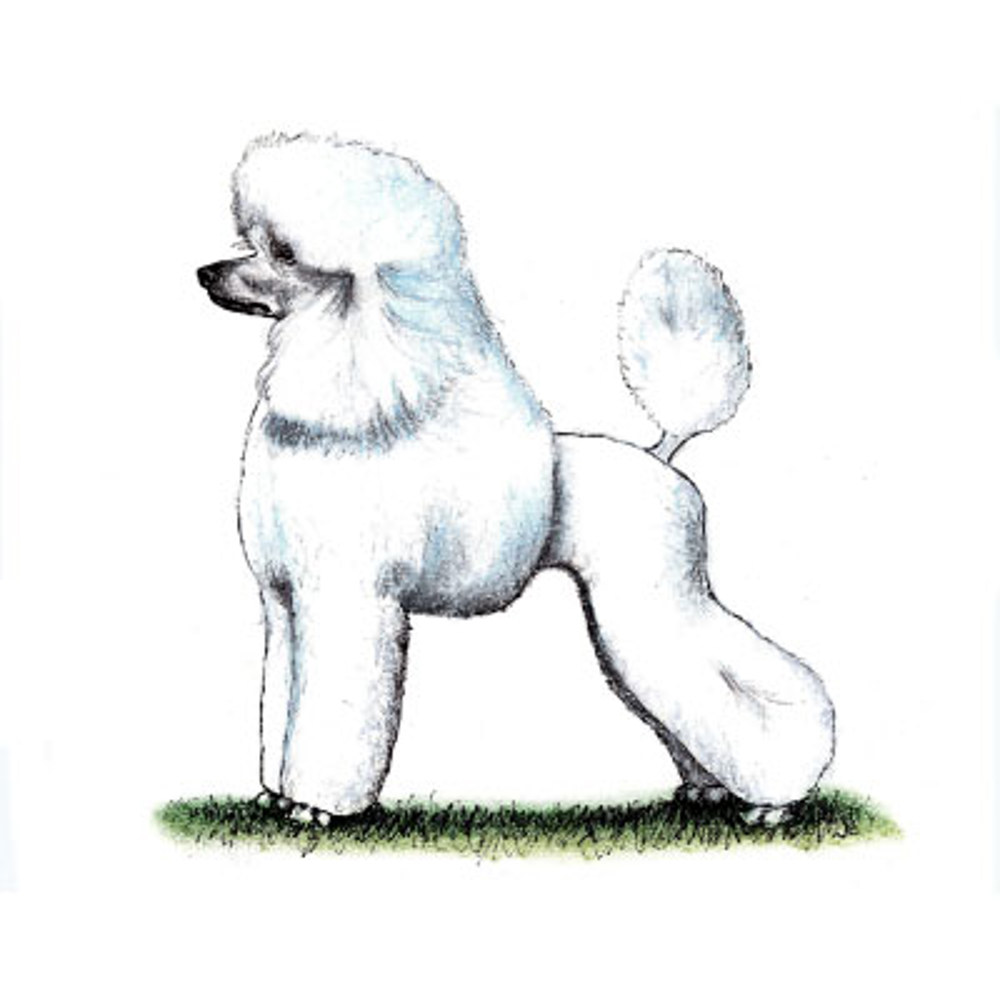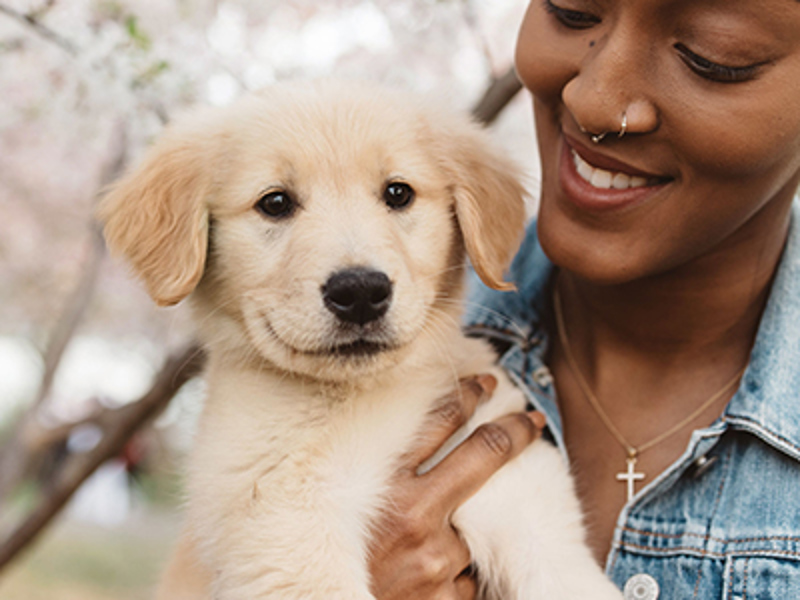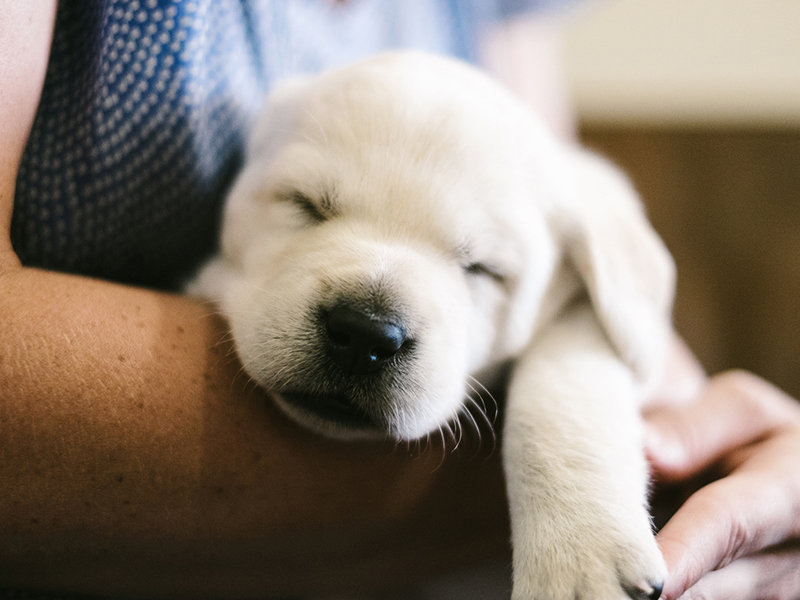
Poodle (Standard)
Breed characteristics
- Size
- Medium
- Exercise
- Up to 1 hour per day
- Size of home
- Large house
- Grooming
- Every day
- Coat length
- Medium
- Sheds
- No
- Lifespan
- Over 12 years
- Vulnerable native breed
- No
- Town or country
- Either
- Size of garden
- Large garden
About this breed
The Poodle originates in Germany, where it was bred as a water retriever, used by duck hunters. The ancestors of the breed were various water dogs of Europe. The trim, which is sometimes viewed as a fashionable fancy trim for show dogs, is in fact traditional and very practical: the hindquarters being clipped to aid the dog’s propulsion in swimming and the protective bands of hair (now fancifully called pom-poms) left on the joints and tip of the tail for protection from cold.
The Kennel Club recognises three varieties, differentiated by size. All share the same standard. The Miniature and the Toy varieties are a result of scaling down and capturing the same features in a smaller mould. Earlier Standards recommended that the traditional lion trim was used in the show ring. More recently it has been acceptable to show Poodles in other types of trim.
Images for this breed
The Utility breed group
This group consists of miscellaneous breeds of dog mainly of a non-sporting origin, including the Bulldog, Dalmatian, Akita and Poodle. The name ‘Utility’ essentially means fitness for a purpose and this group consists of an extremely mixed and varied bunch, most breeds having been selectively bred to perform a specific function not included in the sporting and working categories. Some of the breeds listed in the group are the oldest documented breeds of dog in the world.
Colour Watch
Category 3: Breeds with >10% to 30% registered NBS colours or between 500 and 1000 NBS registrations per annum
Breed Standard colours
Breed standard colour means that the colour is accepted within the breed standard and is a traditional and well-known colour in this breed.
Breed standard colours in this breed include:
- Apricot
- Black
- Blue
- Brown
- Cream
- Red
- Silver
- White
Non-breed-standard colours
- (NBS) Apricot & White
- (NBS) Black & Tan
- (NBS) Black & White
- (NBS) Brown & White
- (NBS) Blue & White
- (NBS) Cream & White
- (NBS) Particolour
- (NBS) Red & White
- (NBS) Sable
- (NBS) Silver & White
Non-breed-standard colour means that the colour is not accepted within the breed standard and whilst some dogs within the breed may be this colour, it is advised to only select a dog that fits within the breed standards for all points.
Colour is only one consideration when picking a breed or individual dog. Health and temperament should always be a priority over colour.
*Other colour/s
'Other' means you consider your puppy to be a colour not currently known within the breed and one that does not appear on either the breed standard or non-breed-standard list. In this instance you would be directed through our registration process to contact a breed club and/or council to support you on identifying and correctly listing the new colour.
Health
Whether you’re thinking of buying a Standard Poodle puppy, or breeding from your dog, it’s essential that you know what health issues may be found in your breed. That's why we've teamed up with Weatherbys Scientific, a leading DNA testing lab, to create our breed specific packages.
To support your health testing journey, we provide our tailored Poodle (Standard)Breed-Specific Package. Giving you the information you need about potential health risks, this package includes Progressive retinal atrophy (prcd-PRA), Progressive retinal atrophy (PRA-rcd4) and von Willebrand disease type 1 (vWD 1) and DNA Profile (SNP - ISAG 2020)
4 essential tests valued at £255 for just £150, that screen for multiple conditions at once, saving you time and providing vital health information.
Pre-breeding Health Screening
Best Practice schemes and tests
These tests address conditions that are still significant for the breed, though they may not be as critical as those listed under Good Practice. They might be less common or newly identified, and research is ongoing to determine their full impact.
To support the breed’s health, responsible breeders should ensure they complete all tests in both categories. Following our Best Practice guidelines means completing both the Good Practice and Best Practice tests for your breed.
DNA test for:
- Progressive retinal atrophy (PRA (rcd4)) - Find a list of tested dogs here
- Progressive retinal atrophy (prcd-PRA)* imported dogs must be tested for these tests to prevent reintroduction into the UK population. Find a list of tested dogs here
- DNA test for von Willebrand disease (vWD1) - Find a list of tested dogs here
- Eye testing using the BVA/KC/ISDS Eye Scheme
- Hip testing (for hip dysplasia) using the BVA/KC Hip Dysplasia Scheme
This breed also has a breed club health scheme, with further information available here
Find out about a particular dog's results
Please visit our Health Test Results Finder to discover the DNA or screening scheme test results for any dog on The Kennel Club's Breed or Activity Register.
You can also view the inbreeding coefficient calculation for a puppy's parents, or for a dog you're thinking of breeding from.
DNA Testing Services
Whether you’re thinking of buying a Standard Poodle puppy, or breeding from your dog, it’s essential that you know what health issues may be found in your breed. That's why we've teamed up with Weatherbys Scientific, a leading DNA testing lab, to create our breed specific packages.
To support your health testing journey, we provide our tailored Poodle (Standard)Breed-Specific Package. Giving you the information you need about potential health risks, this package includes Progressive retinal atrophy (prcd-PRA), Progressive retinal atrophy (PRA-rcd4) and von Willebrand disease type 1 (vWD 1) and DNA Profile (SNP - ISAG 2020)
4 essential tests valued at £255 for just £150, that screen for multiple conditions at once, saving you time and providing vital health information.
Breed Health & Conservation Plan
The Breed Health and Conservation Plans
Our breed health and conservations plans (BHCPs) use evidence and data to help us understand the health issues found in each pedigree dog breed. These plans help breeders and owners identify health and welfare problems and use information, health tests and health schemes to avoid passing on those problems to future puppies. They also support and provide breeders with tools and specialist expertise to help manage genetic diversity, understand the impacts of close breeding, and find the best ways to preserve the population of their breed.
Working together for the breed
We’ve worked with breed clubs and breed representatives to gather all available evidence to help us determine the priority concerns for the breed and decide how we can work together to manage and reduce these problems.
The full evidence base is available at the discretion of the breed clubs, however if you would like to seek access to the full report, please contact our health team.
More about health
Have any questions about health in your breed?
If you have any concerns about a particular health condition in your breed then you may wish to speak to your vet or you could contact your breed health co-ordinator.
Breed health co-ordinators are individuals working on behalf of breed clubs and councils who are advocates for the health and welfare of their chosen breed. They acts as a spokesperson on matters of health and will collaborate with The Kennel Club on any health concerns the breed may have.
To contact your breed health co-ordinator please email
Health (The Kennel Club)
Breed watch
Category 1
Currently no points of concern specific to this breed have been identified for special attention by judges, other than those covered routinely by The Kennel Club's breed standard.
Breeding restrictions
There are a number of The Kennel Club rules and regulations that may prevent a litter from being registered, find out about our general and breed specific breeding restrictions below.
More about breeding
With effect from 6 January 2025, imported Standard Poodles and litters from overseas sires will only be eligible for Kennel Club registration if they are proven to be clear or carriers of progressive retinal atrophy (prcd-PRA) and progressive retinal atrophy (PRA rcd4), or if they have hereditary clear status.
Identified carriers may be used for breeding, provided they are only mated to a Standard Poodle that is either hereditarily clear or DNA-tested clear of prcd-PRA and PRA (rcd4).
For litters with overseas sires, the sire must be proven to be either clear or a carrier of the conditions.
This scheme has been introduced at the request of the Breed Club(s) to safeguard the UK Standard Poodle population from the introduction of these conditions.
Looking for a puppy?
Looking for a Poodle (Standard)? Explore our list of puppies and rescue dogs for sale near you.
More information

Need to find out more about a breed?
Use our Find a Club service where you can locate breed clubs that can offer support and advice.

Use our Find a Puppy service
The Kennel Club's Find a Puppy service provides contact details for breeders who have puppies available. Let's help you find your new best friend.

Get the best lifetime pet insurance
At Kennel Club Pet Insurance, we want you to focus on getting the best possible treatment for your dog without worrying about the cost.

